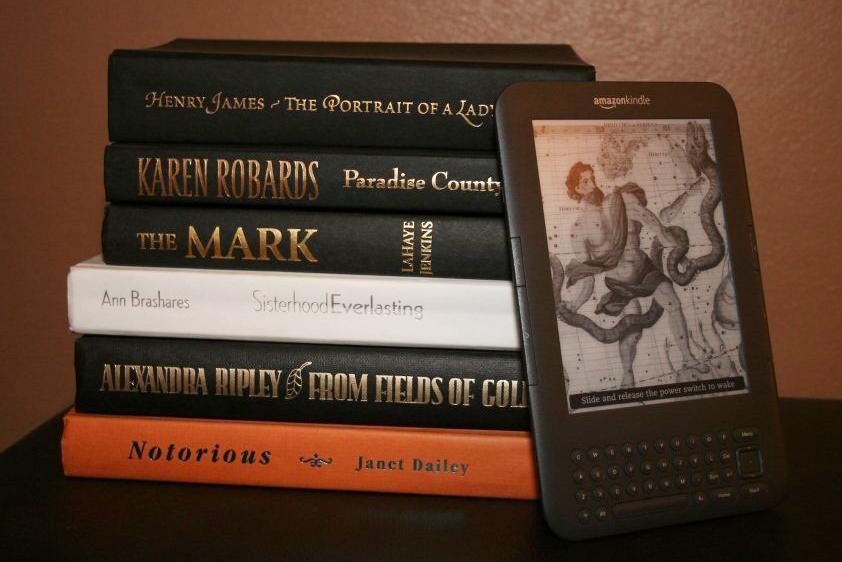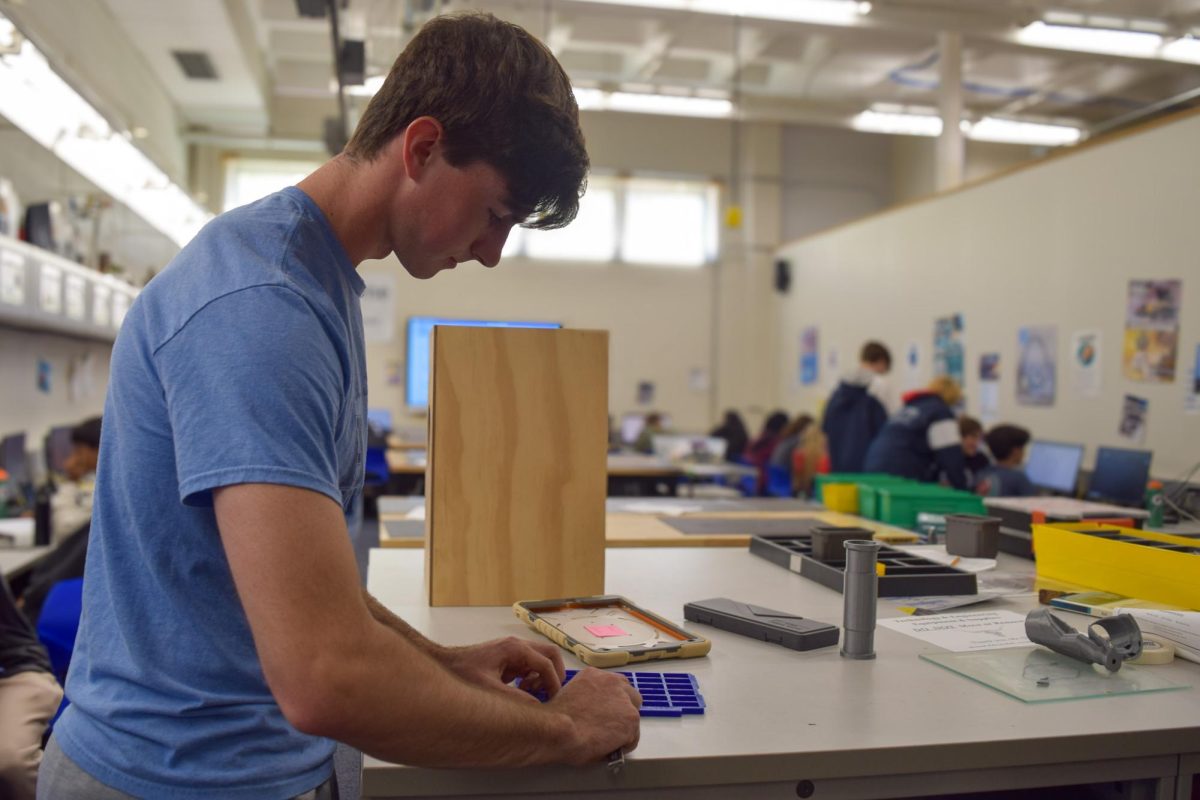Your English teacher just assigned you a research paper over the American Revolution. Where do you start? To most students, they open Safari on their iPhones or Google on their laptops and research through the Internet. Reading actual paper copies of books and periodicals are an afterthought, and some might not even realize the library has a set of encyclopedias.
The new millennium sparked a new age, a “digital age,” where more and more things are going online and information is portable and easy to find. Companies are reaching out to a new group of customers by creating websites, allowing online shopping, generally making it more convenient to the consumer. Whether it’s calendars, newspapers, or shopping, we all take advantage of this “digital age” one way or another.
In school, teachers have websites to give students extra information on assignments and allow parents to know what their child is learning in a certain class. Students can easily shoot their teachers an email if they have questions. Some classes, such as Chemistry classes, have online homework once or twice a week.
“I like how you can immediately know if you got the answer right or wrong, and you can fix it accordingly,” senior Alyssa Wagner said.
Researching the American Revolution has never been simpler. Type “American Revolution” into the box on a search engine and hundreds of websites pop up with a multitude of information. But with this abundance of information comes some challenges for students.
“Using the Internet is much better because you don’t have to go all the way to the library to research,” Wagner said. “On the other hand, it is easier to come up with your own words when you research from a book. You aren’t as tempted to just copy and paste the information from a website.”
Not only are paper copies of research books becoming less used, but avid readers are buying electronic versions of books and reading them on eReaders, such as the Kindle by Amazon or Nook by Barnes and Noble. Now instead of lugging around four or five heavy books to the beach, you can carry a small, lightweight tablet that can hold 20 books at a time. According to thedailybeast.com, people who use tablets, for reading and for other use, are expected to rise from 13 million people two years ago to 70 million.
“I refuse to read off a tablet,” Latin teacher Tom Herpel said. “Yes, a tablet displays what page you are on out of the total number in the book, but it’s different than holding the physical book in your hand and the feeling the progress you have made.”
Newspapers and magazine have caught on to this trend as well. Newsweek magazine’s Dec. 31 issue was the last paper issue they offered. Now all their stories are online.
From these websites, companies can expand what they put on their websites. For example, instead of just posting general news and feature stories, writers can go more interactive with their readers, like polls. “Letter to the Editor” has become “Emails to the Editor,” which is more convenient and more readers are more likely to write to them.
Newspapers online are not only convenient, but also free. Instead of buying a subscription to the Post Dispatch or New York Times, you can just type in their website and read their articles. Online articles are much more updated, giving you the most current information on a story.
Another aspect of this digital revolution was used frequently during the holiday season: online shopping. Websites like Amazon.com offered free shipping for purchases up to a certain amount. This allowed parents and students to simply type in their information, give them a credit card number, and in five to ten business days, their entire gift list would be shipped directly to their house.
“Today, everything is more convenient,” Wagner said. “Everyone uses the Internet, so it is much easier for consumers to access a company’s information from a website or emails.”
That’s what the digital age comes down to: convenience. Whether it is using gift cards programmed into your smart phone, following MapQuest directions to the Fox, or reading all Harry Potter books from a 10 ounce tablet, technology today offers us information that is easy to find, easy to use, and in many cases, portable. Every year, we are coming closer to living in a paperless world.


![Focused on providing exceptional service, sophomore Darsh Mahapatra carefully cleans the door of a customer’s car. Mahapatra has always believed his customers deserve nothing less than the best. “[If] they’re trusting us with their car and our service, then I am convinced that they deserve our 100 percent effort and beyond,” Mahapatra said.](https://pwestpathfinder.com/wp-content/uploads/2025/10/DSC_0018-1200x800.jpg)
![Sophomore Aleix Pi de Cabanyes Navarro (left) finishes up a soccer game while junior Ava Muench (right) warms up for cross country practice. The two came to Parkway West High School as exchange students for the 2025-2026 school year. “The goal for the [exchange] program is to provide opportunities for both Parkway students and our international exchange students to learn about other cultures, build connections and become confident, capable, curious and caring — Parkway’s Four C’s — in the process,” Exchange Program Lead Lauren Farrelly said.](https://pwestpathfinder.com/wp-content/uploads/2025/10/Feature-Photo-1200x800.png)

![Gazing across the stage, sophomore Alexis Monteleone performs in the school theater. The Monteleone family’s band “Monte and the Machine” has been releasing music since 2012, but Alexis started her own solo career in 2024 with the release of her first single, Crying Skies. “My whole family is very musical, [and I especially] love writing [songs with them],” Monteleone said.](https://pwestpathfinder.com/wp-content/uploads/2025/09/DSC7463-1200x798.jpg)
![Amid teaching a lesson to her AP Calculus BC class, Kristin Judd jokes alongside her students in their funny remarks. Judd has always enjoyed keeping the mood light in her classroom, along with on the volleyball court. “[I enjoy] that side talk where you see [or] overhear a conversation and chime in, or somebody says something funny,” Judd said.](https://pwestpathfinder.com/wp-content/uploads/2025/09/image-1200x730.jpg)
![Eyeing the ball, junior Ella McNeal poses for her commitment pictures at Clemson University. McNeal’s commitment comes after months of contact with top Division 1 soccer programs. “ It has taken a lot to get to where I am, but I know that [what] I've already been through is just the beginning, and I can't wait for what is to come,” McNeal said.](https://pwestpathfinder.com/wp-content/uploads/2025/09/IMG_4926-1200x900.jpeg)


![Senior Adam Zerega stands with senior Dexter Brooks by farm equipment. Zerega often worked with friends and family on his farm. “I've been able to go to my family's farm since I was born. I [spend] at least three weekends a month [on the farm], so I'm there all the time,” Zerega said.](https://pwestpathfinder.com/wp-content/uploads/2025/04/IMG_4872-1200x900.jpg)
